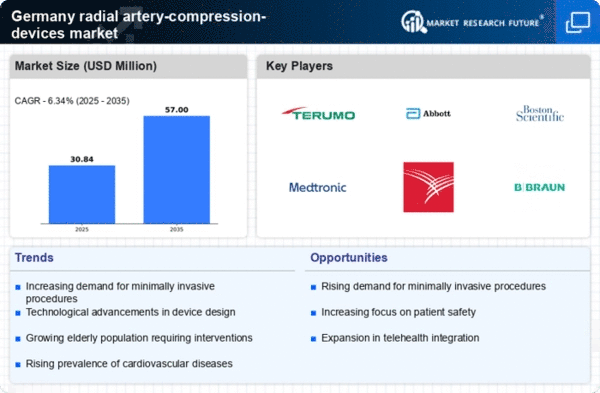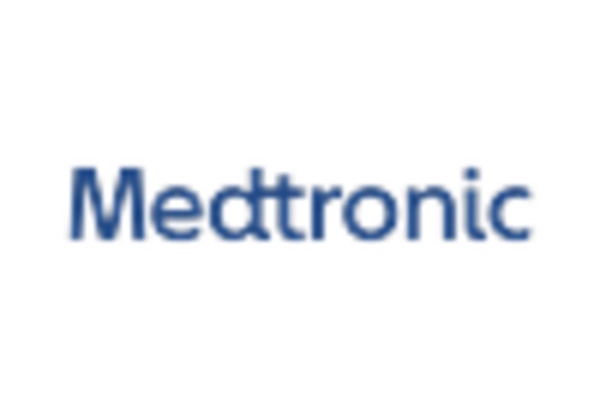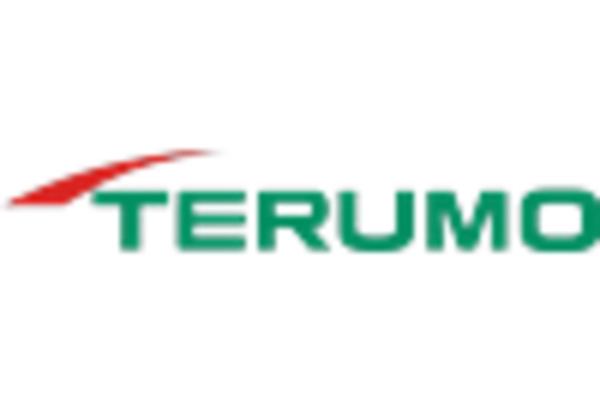Technological Innovations in Medical Devices
The radial artery-compression-devices market is experiencing a wave of technological innovations that are enhancing device efficacy and user experience. Recent advancements in materials and design have led to the development of more effective compression devices that minimize complications and improve patient outcomes. In Germany, the integration of smart technology into these devices is becoming more prevalent, allowing for real-time monitoring and data collection. This trend not only improves the safety and effectiveness of procedures but also aligns with the broader movement towards digital health solutions. As hospitals and clinics adopt these innovations, the market for radial artery-compression devices is likely to expand significantly.
Government Initiatives and Funding for Healthcare
Government initiatives aimed at improving healthcare infrastructure in Germany are positively impacting the radial artery-compression-devices market. Increased funding for cardiovascular health programs and the promotion of advanced medical technologies are key drivers. The German government has been actively investing in healthcare innovations, with a reported increase of 15% in funding for medical device research and development in recent years. This financial support is likely to facilitate the growth of the radial artery-compression-devices market, as manufacturers are encouraged to innovate and improve their product offerings. Such initiatives not only enhance device availability but also promote better healthcare outcomes.
Aging Population and Rising Cardiovascular Diseases
Germany's aging population is a significant factor influencing the radial artery-compression-devices market. As the demographic shifts towards an older age group, the prevalence of cardiovascular diseases is anticipated to rise. Reports indicate that approximately 40% of the elderly population in Germany suffers from some form of cardiovascular condition, necessitating effective treatment options. This demographic trend is likely to drive the demand for radial artery-compression devices, as they are essential for procedures such as angioplasty and stenting. The healthcare system is expected to allocate more resources towards these devices, thereby enhancing their market presence and availability.
Increasing Demand for Minimally Invasive Procedures
The rising preference for minimally invasive procedures in the healthcare sector is a notable driver for the radial artery-compression-devices market. As patients increasingly seek less traumatic options for cardiovascular interventions, the demand for devices that facilitate such procedures is likely to grow. In Germany, the healthcare system is adapting to these trends, with a reported increase in the use of radial access techniques. This shift not only enhances patient recovery times but also reduces hospital stays, which is appealing to both patients and healthcare providers. Consequently, the radial artery-compression-devices market is expected to witness a surge in demand as hospitals and clinics invest in advanced technologies that support these minimally invasive approaches.
Rising Awareness and Education on Cardiovascular Health
There is a growing awareness and education regarding cardiovascular health among the German population, which is driving the radial artery-compression-devices market. Public health campaigns and educational programs have been instrumental in informing individuals about the risks associated with cardiovascular diseases and the importance of early intervention. As awareness increases, more patients are likely to seek medical attention for cardiovascular issues, leading to a higher demand for procedures that utilize radial artery-compression devices. This trend suggests that healthcare providers will need to be prepared to meet the rising demand, thereby fostering growth in the market.
















